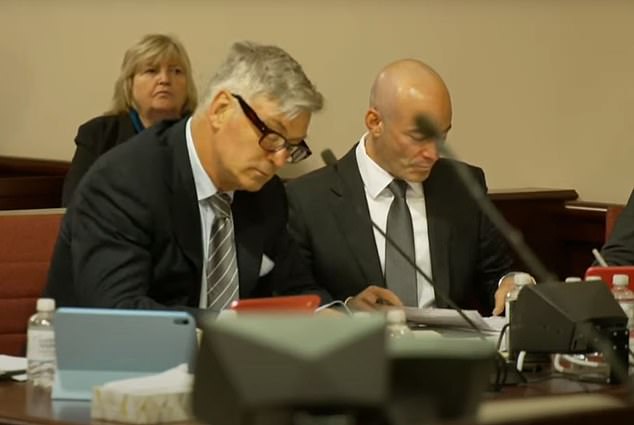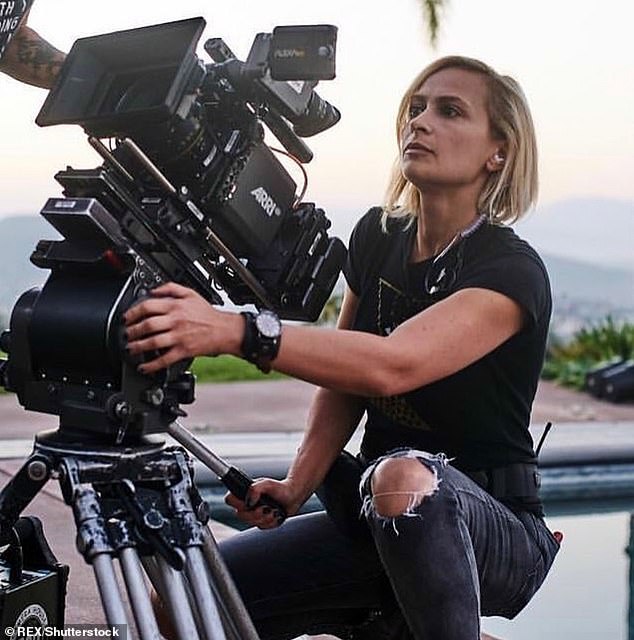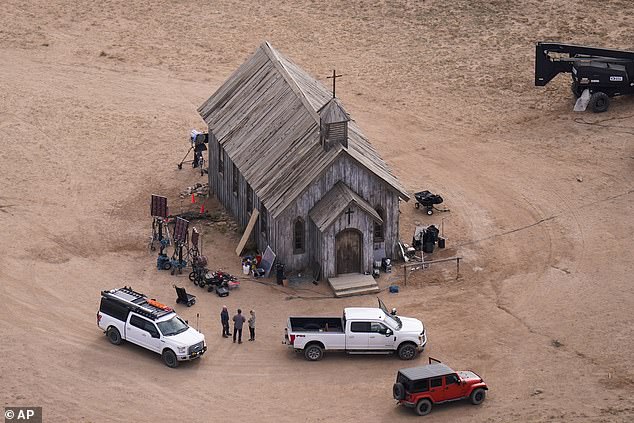He was hunched over his phone, like someone bent in prayer… JAN MOIR sees Alec Baldwin make a surprise appearance at pre-trial hearing for ‘Rust’ film shooting
No one expected Alec Baldwin to appear at his preliminary hearing Monday morning, but just before 8 a.m. he got out of a Chevrolet Suburban with tinted windows and drove to the New Mexico First Judicial District Courthouse here in downtown Santa Fe.
Baldwin, 66, walked slowly toward the courthouse doors, his recent hip surgery leaving him with a shambling gait, his expression blank. He carried a large canvas bag in one hand and could have been a man returning his gardening books to a library rather than a man trying to save his name, his reputation, his career and the rest of his life.
Several camera crews were filming his every move, some from news organizations around the world, others were here as part of various documentary projects about the tragedy. There were even rumors that one of them was from Baldwin’s own upcoming TLC reality series, The Baldwins, starring his wife Hilaria and their seven young children.
Actor Alec Baldwin appeared at the preliminary hearing in Santa Fe on Monday morning

He is charged with involuntary manslaughter for the 2021 shooting of camerawoman Halyna Hutchins
“Oh no. That would be absolutely insane. I just don’t believe it,” said a local newscaster. It certainly seemed unlikely. But no one knew for sure.
On the third floor, past the district attorney’s office and down the polished hallway from the victims’ office, Judge Mary Marlowe Sommer finally opened proceedings in the case of State v. Alexander Rae Baldwin, in which the Emmy-winning actor is charged with involuntary manslaughter for the 2021 fatal shooting of Halyna Hutchins, a camerawoman working on the set of his cowboy film Rust.
She died after being struck by a bullet from a gun Baldwin was holding while rehearsing a scene, a tragic moment that has been the subject of a legal battle for more than three years.
Baldwin sat at the defense table on the left side of the court, flanked by his quad of powerful, expensively bespoke New York lawyers. Among them was Alex Spiro, known as the A-list lawyer for the elite.
He flipped through a stack of photos of the church where the deadly shooting took place, wiggled his knee and gave Baldwin a reassuring pat on the shoulder.
For the state, Chief District Attorney Kari Morrissey and her team sat on the right, perhaps a little more disheveled than their slick, well-groomed big-city opponents.

Mrs. Hutchins died after being struck by a bullet from a gun Baldwin was holding while rehearsing a scene
“Where do I plug this in?” she asked no one in particular, holding a connecting cord.
After months—years!—of legal wrangling and multiple failed attempts by the defense to have the case dismissed, there was no love lost between the two sides. Despite sitting five feet apart throughout the day, Spiro and Morrissey never looked at each other.
Hours of debate ensued over obscure legal issues, disagreements over who should and should not be on the witness list, the “mixing” of live bullets with blanks, and the admissibility of autopsy photos.
There was much talk of “predicate acts” regarding Mr. Baldwin’s previous behavior on the Rust set before the Oct. 21 incident. “Mr. Baldwin is not a murderer on the 21st because he uttered a curse word on the 16th,” his attorney Luke Nikas argued.

The incident, which has been at the center of a legal battle for more than three years, occurred on the set of Baldwin’s cowboy film Rust
Both sides regularly accused each other of abusing the system and trying to gain a “tactical advantage.” Sometimes it even got a little heated. “You know if the state had done this, they’d be screaming that we’d ruined the defense,” was one confused but plaintive cry. “They just cut and pasted that!” was another.
Throughout it all, Alec Baldwin sat with his fingers interlaced and his head slightly bowed. Sometimes he put on black-rimmed glasses and took notes on a yellow legal pad. He listened intently as Judge Sommer—well—explained the law between the contending teams.
“Anytime you want to say something that’s not a question to the witness, you come here to the bench. You can’t do it from there,” she told Spiro. “I’m the boss here.”
On another occasion, she said to him, “Can you answer my question? You’ve had your chance.” He did as he was told. “We’ve come a long way to get here, all we want is a fair trial,” he said.
The pretrial arguments are now over. Today a jury will be sworn in and tomorrow the actual trial begins.
Here, in this windowless criminal courthouse, its ragged carpet and faded lemon-colored walls testifying to decades of human despair, Alec Baldwin’s fate will finally be decided.
During a court case, I saw him in the hallway, hunched over his phone like a man in prayer, tap-tap-tap typing out a message.
